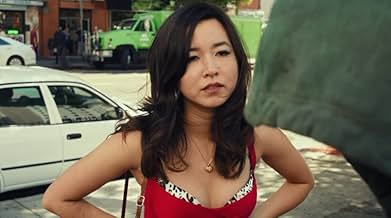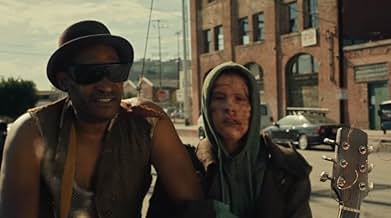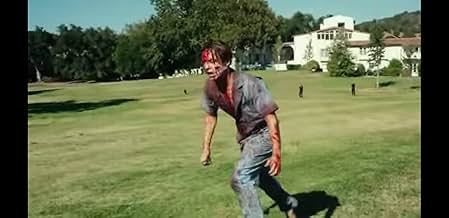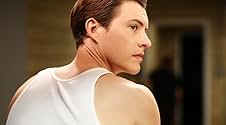NOTE IMDb
5,1/10
3,2 k
MA NOTE
Lorsque le Monstre se réveille dans un laboratoire, c'est encore un enfant dans un corps d'adulte. Il est innocent, mais la violence qu'on lui inflige lors de tests médicaux va lui faire déc... Tout lireLorsque le Monstre se réveille dans un laboratoire, c'est encore un enfant dans un corps d'adulte. Il est innocent, mais la violence qu'on lui inflige lors de tests médicaux va lui faire découvrir l'existence d'un monde sombre et cruel.Lorsque le Monstre se réveille dans un laboratoire, c'est encore un enfant dans un corps d'adulte. Il est innocent, mais la violence qu'on lui inflige lors de tests médicaux va lui faire découvrir l'existence d'un monde sombre et cruel.
- Réalisation
- Scénario
- Casting principal
- Récompenses
- 3 victoires au total
Peter Adrian Sudarso
- Guard 1
- (as Peter Sudarso)
Mckenna Grace
- Molly
- (as McKenna Grace)
Ron Rogge'
- Officer Woodcock
- (as Ron Roggé)
Avis à la une
Bernard Rose has a knack for bringing the human condition into characters on screen, and from there, transposing it to our minds as audience members when we are experiencing his pictures. 'Candyman', 'Paperhouse', and 'Immortal Beloved' are all zenith examples of mythical "genre films" wherein the real themes presented are the characters themselves, and the iconographies of genre lay by the wayside, standing as mere coincidence, rather than complete audience draw. In his newest picture, a modern retelling of Mary Shelley's classic story of Gothic horror and the default of man and his flaws, 'Frankenstein', carries on this method, and even perfects it in many areas.
Like 'Candyman', this film attempts to project the feared myths of culture past and folklore on an already assuming audience in attempt to bring the tale to real terms. What we get in return, is a story not about fabled characters, but real people; people that we all know. The plot (given brief) concerns itself with a more loyal take on the story - Doctor Viktor Frankenstein (Huston), his wife (Moss, who has never looked lovelier), and their assistant are research scientists attempting to create the perfect proto-human (Samuel). Once this goal is achieved, there may be a way to create cures and longevity in the medicinal field. The project is completed and a man is born.
Scientific difficulties prove unforeseen and our perfect human being becomes something a little less human. A practice to put the proto-man down via lethal injection backfires, and thus the "Monster" is unleashed upon the world. Instead of a London town in history, unleashed upon in fear, we have the modern Metropolis of Los Angeles swept away in doubt. This propels the story (and film) to a platform that renders anything possible, and for anything to happen. And it does. Many of the characters from the story are present here, devoutly portrayed, and slyly woven into the very fabric of how we view society today.
What this brings about, is an emotionally charged, utterly compelling, and beautifully deranged epic tale with relevant themes that reign very akin to previous Rose fare: Prejudice, class struggle, inner demons vs. the evil of man, et al. All the violence, degradation, mutilation, and gore to be found in the story are present, but in a way that reminds us how very human, and vulnerable we are. Slight bits of comic relief litter the film, but the direction is so spot on, and the story, so poignantly told, that it's actually difficult to catch the drift, and spot the poetic irony. Rose indulges in his fare share of gore, violence, and the surrender of man in the face of true danger, all the while making the audience realize how ignorant we are to how bad the world can be, and therefore taking away the sense of security we feel sitting in a darkened movie theater, and pulling the veneer off of the simple picture we are experiencing. However, it's there, in all it's glory. Rose tips his hat to the underdogs of the world today, while reminding us that it also takes a man (or woman) with good intention to bring about the changes that the world is perpetually cycling through.
A good film will, regardless of genre or intended audience, make it's audience laugh, cry, tremble, or become angry. The best ones are capable of accomplishing all, and leaving the audience in the deepest comatose state of reflection upon leaving the Movie House. Bernard Rose's adaptation of "Frankenstein" manages to do all of this and more. In the end, he delivers a bona fide ADULT Horror Movie that should satisfy genre fans and fans of the original story alike. Sadly, the film, being distributed independently will probably never be as recognized as it's predecessors, given the desensitization to horror and the egoistic regain of people of the "I" generation, who even in this film appear to be the real "Monsters" of this world.
Like 'Candyman', this film attempts to project the feared myths of culture past and folklore on an already assuming audience in attempt to bring the tale to real terms. What we get in return, is a story not about fabled characters, but real people; people that we all know. The plot (given brief) concerns itself with a more loyal take on the story - Doctor Viktor Frankenstein (Huston), his wife (Moss, who has never looked lovelier), and their assistant are research scientists attempting to create the perfect proto-human (Samuel). Once this goal is achieved, there may be a way to create cures and longevity in the medicinal field. The project is completed and a man is born.
Scientific difficulties prove unforeseen and our perfect human being becomes something a little less human. A practice to put the proto-man down via lethal injection backfires, and thus the "Monster" is unleashed upon the world. Instead of a London town in history, unleashed upon in fear, we have the modern Metropolis of Los Angeles swept away in doubt. This propels the story (and film) to a platform that renders anything possible, and for anything to happen. And it does. Many of the characters from the story are present here, devoutly portrayed, and slyly woven into the very fabric of how we view society today.
What this brings about, is an emotionally charged, utterly compelling, and beautifully deranged epic tale with relevant themes that reign very akin to previous Rose fare: Prejudice, class struggle, inner demons vs. the evil of man, et al. All the violence, degradation, mutilation, and gore to be found in the story are present, but in a way that reminds us how very human, and vulnerable we are. Slight bits of comic relief litter the film, but the direction is so spot on, and the story, so poignantly told, that it's actually difficult to catch the drift, and spot the poetic irony. Rose indulges in his fare share of gore, violence, and the surrender of man in the face of true danger, all the while making the audience realize how ignorant we are to how bad the world can be, and therefore taking away the sense of security we feel sitting in a darkened movie theater, and pulling the veneer off of the simple picture we are experiencing. However, it's there, in all it's glory. Rose tips his hat to the underdogs of the world today, while reminding us that it also takes a man (or woman) with good intention to bring about the changes that the world is perpetually cycling through.
A good film will, regardless of genre or intended audience, make it's audience laugh, cry, tremble, or become angry. The best ones are capable of accomplishing all, and leaving the audience in the deepest comatose state of reflection upon leaving the Movie House. Bernard Rose's adaptation of "Frankenstein" manages to do all of this and more. In the end, he delivers a bona fide ADULT Horror Movie that should satisfy genre fans and fans of the original story alike. Sadly, the film, being distributed independently will probably never be as recognized as it's predecessors, given the desensitization to horror and the egoistic regain of people of the "I" generation, who even in this film appear to be the real "Monsters" of this world.
Bernard Rose has successfully translated Mary Shelley's original novel by turning it into a Cronenbergian body horror tragedy.
The performances are stellar with Xavier Samuel making a heartbreaking Monster and Tony Todd stealing the show as a blind musician.
The direction is superb and horror fans will be pleased by the gruesome practical effects. If there are any weak points here, it would be the extremely brisk pacing and a few odd editing decision.
The ending is also frustratingly abrupt. Beyond that, it is nothing less than a triumph of genre filmmaking and the sort of thing I wish to see more of from the horror world.
The performances are stellar with Xavier Samuel making a heartbreaking Monster and Tony Todd stealing the show as a blind musician.
The direction is superb and horror fans will be pleased by the gruesome practical effects. If there are any weak points here, it would be the extremely brisk pacing and a few odd editing decision.
The ending is also frustratingly abrupt. Beyond that, it is nothing less than a triumph of genre filmmaking and the sort of thing I wish to see more of from the horror world.
I skipped this small release (although it does feature recognizable actors Carrie-Anne Moss, Danny Huston and Tony Todd in supporting roles) in my survey of Frankenstein films back in 2018 during the 200th anniversary of Mary Shelley's novel, apparently, as I now know from seeing it, with good reason given that it's largely a retread of the same episodes we've seen in prior cinematic adaptations of the popular story--mainly, the 1931 Universal classic. There's the "It's Alive!" reiteration, the little girl being tossed in a lake, the mob attack and the monster threatening Frankenstein's white-clothed bride in her bedroom--none of which is actually from the book, but rather from the 1931 film. That's not to say these filmmakers didn't read the source, though, as they evidently did from some of the additions here: the blind man, the narrated philosophical musings and a fiery end closer to the original text than to James Whale's pictures.
The most readily apparent distinction of this version is, of course, how grotesque the monster is, but there are also a couple other oddities here--one of which makes me happy I saw the movie. First, the part I'm not keen on is the picture's biblical allusions. Besides the creature being named "Adam," when the Frankensteins go about trying to murder him, they strap him down in a crucifixion pose, although they employ supposedly-more-civilized means to execute him with lethal injection. Little wonder, then, whether this Christ figure will be resurrected. Come to think of it, though, the 1935 sequel "Bride of Frankenstein" also included some Christ allegory with Boris Karloff being tied up by a mob--so this part isn't even that unusual.
Yet, the dreams are something else. My ranking of Frankenstein films is now over 50 entries, and I've never seen one movie that attempted to depict in any way the disturbing and intriguing nightmare from Shelley's story. This one comes closest. In the book, Victor Frankenstein's dream of kissing Elizabeth turns into one of his embracing his dead mother. The dream here, while it plays out seemingly for more bittersweet intent and from the creature's dreaming, still manages to incorporate similar suggestions of incest and necrophilia. The Elizabeth Frankenstein in this movie, after all, is both the mother figure to the creature and the focal point of his romantic and sexual desires. Each time the monster attacks Victor Frankenstein, then, to get to the mother, it becomes an Oedipus complex. That seems more frightening to me than a guy made up to appear covered in boils.
The most readily apparent distinction of this version is, of course, how grotesque the monster is, but there are also a couple other oddities here--one of which makes me happy I saw the movie. First, the part I'm not keen on is the picture's biblical allusions. Besides the creature being named "Adam," when the Frankensteins go about trying to murder him, they strap him down in a crucifixion pose, although they employ supposedly-more-civilized means to execute him with lethal injection. Little wonder, then, whether this Christ figure will be resurrected. Come to think of it, though, the 1935 sequel "Bride of Frankenstein" also included some Christ allegory with Boris Karloff being tied up by a mob--so this part isn't even that unusual.
Yet, the dreams are something else. My ranking of Frankenstein films is now over 50 entries, and I've never seen one movie that attempted to depict in any way the disturbing and intriguing nightmare from Shelley's story. This one comes closest. In the book, Victor Frankenstein's dream of kissing Elizabeth turns into one of his embracing his dead mother. The dream here, while it plays out seemingly for more bittersweet intent and from the creature's dreaming, still manages to incorporate similar suggestions of incest and necrophilia. The Elizabeth Frankenstein in this movie, after all, is both the mother figure to the creature and the focal point of his romantic and sexual desires. Each time the monster attacks Victor Frankenstein, then, to get to the mother, it becomes an Oedipus complex. That seems more frightening to me than a guy made up to appear covered in boils.
6.75 of 10. Frankenstein zombie or Frankenstein clone? It's definitely not Frankenstein robot. Nonetheless, it feels like a horror story inspired by Philip K. Dick's Do Androids Dream of Electric Sheep? - or at least the the question, not the more developed Blade Runner adaptation.
It's better than any of the film/TV versions of Frankenstein. Rather than trying to stay literal to a story we know is, at least technically, nonsense, it pursues a more realistic though still at the moment purely sci-fi angle.
What makes the film engaging beyond the slightly revised plot setup is the pacing and the thoughtful adaptation and fitting in of the book characters that interact with "Monster". What makes it less engaging is the narration. By the end it feels like a setup for either a TV series or a sequel or 2 rather than a complete story.
It's better than any of the film/TV versions of Frankenstein. Rather than trying to stay literal to a story we know is, at least technically, nonsense, it pursues a more realistic though still at the moment purely sci-fi angle.
What makes the film engaging beyond the slightly revised plot setup is the pacing and the thoughtful adaptation and fitting in of the book characters that interact with "Monster". What makes it less engaging is the narration. By the end it feels like a setup for either a TV series or a sequel or 2 rather than a complete story.
Modern update of the famous story, here set in LA. Instead of a nuts and bolts style monster, such as Karloff, we have a pretty boy who is fond of saying the word "Mum". We get the young girl thrown into the lake, plus the befriending by a blind guy (well played by Tony Tod, who generously pays for Adam - I mean the monster - to have his wicked way with a hooker!). Plenty of gore. And production values are all good enough too. Now I'm all in favour of reimagening classic stories but I felt that this one didn't quite work and if I want to see a Frankenstein movie then give me Universal or Hammer instead.
Le saviez-vous
- AnecdotesAs Wanda is searching her phone for information on Elizabeth Frankenstein, a quick shot suggests that the Frankensteins were affiliated with some corporation named Shelley. This is a direct reference to Mary Wollstonecraft Shelley, who wrote the original story.
- GaffesAt the end, Elizabeth is dead. But when Adam carries her, her arm is completely wrapped around his neck as he carries her to the fire. A dead person's arm could not maintain such a position, even if placed there by the carrier; only a live person, using muscles, would be able to keep the arm up like that. Without muscles, it would just hang down behind him. Also, as he carries her, his left arm is supporting her torso and her head is upright. Again, a head maintaining such a position would be impossible for a dead person. A dead person would have no muscles to keep a head up. Instead, it would droop backwards in the direction of gravity. Finally, as he places her down on the burning logs, her head slowly descends, whereas it should fall down, since, again, there are no working muscles to control its descent. All of this is also true if she were merely unconscious.
- ConnexionsReferenced in The Candyman Legacy with Tony Todd (2015)
- Bandes originalesMannish Boy
Written by Melvin London, Bo Diddley (as Elias McDaniel) and Muddy Waters (as McKinley Morganfield)
Performed by Tony Todd
Meilleurs choix
Connectez-vous pour évaluer et suivre la liste de favoris afin de recevoir des recommandations personnalisées
- How long is Frankenstein?Alimenté par Alexa
Détails
- Date de sortie
- Pays d’origine
- Site officiel
- Langue
- Aussi connu sous le nom de
- Франкенштейн
- Lieux de tournage
- Sociétés de production
- Voir plus de crédits d'entreprise sur IMDbPro
Box-office
- Montant brut mondial
- 253 514 $US
- Durée1 heure 29 minutes
- Couleur
- Rapport de forme
- 1.78 : 1
Contribuer à cette page
Suggérer une modification ou ajouter du contenu manquant

































